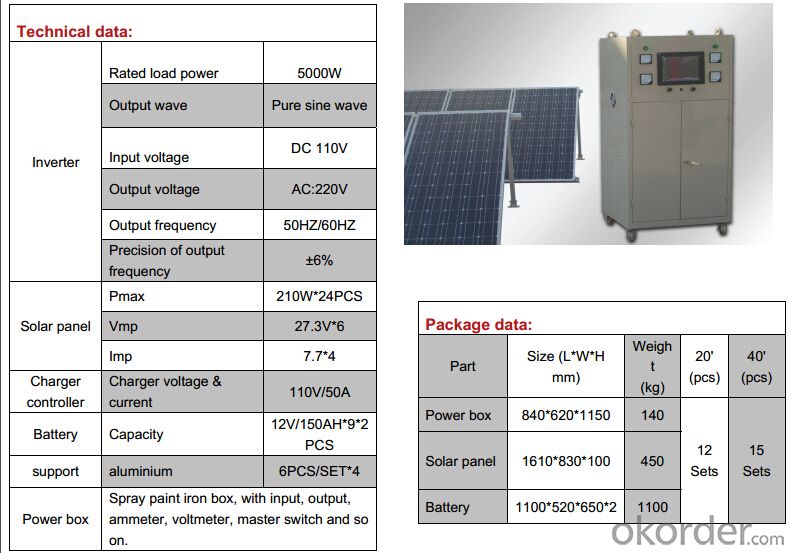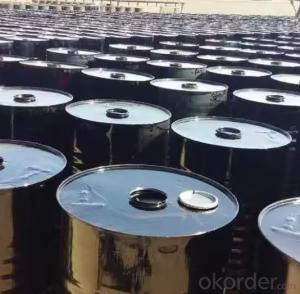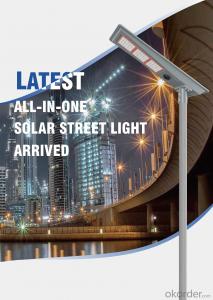Solar System 5KW
- Loading Port:
- China Main Port
- Payment Terms:
- TT or LC
- Min Order Qty:
- -
- Supply Capability:
- -
OKorder Service Pledge
Quality Product, Order Online Tracking, Timely Delivery
OKorder Financial Service
Credit Rating, Credit Services, Credit Purchasing
You Might Also Like

- Q:Are solar energy systems environmentally friendly?
- Yes, solar energy systems are considered environmentally friendly. They generate electricity without producing harmful greenhouse gas emissions, reducing our dependence on fossil fuels and contributing to the fight against climate change. Additionally, the manufacturing and operation of solar panels have minimal impact on the environment, making them a sustainable and clean energy solution.
- Q:Can solar energy systems be used in residential areas with homeowners associations?
- Yes, solar energy systems can be used in residential areas with homeowners associations (HOAs). However, the specific rules and regulations regarding solar energy systems may vary depending on the HOA. Some HOAs may have restrictions on the size, type, and placement of solar panels, while others may have specific guidelines in place to ensure aesthetic and architectural harmony within the community. In the United States, the federal government has enacted legislation to protect homeowners' rights to install solar energy systems, including within HOAs. The Solar Rights Act, signed into law in 1978, prohibits HOAs from outright banning the installation of solar energy systems. However, HOAs are allowed to impose reasonable restrictions to protect the community's overall aesthetics and property values. If you live in a residential area with an HOA and are interested in installing a solar energy system, it is important to review the HOA's guidelines and restrictions. Many HOAs have specific processes and procedures for homeowners to follow when seeking approval for solar panel installations. This may involve submitting a design proposal, obtaining necessary permits, and complying with any architectural or aesthetic requirements. It is also worth noting that solar energy systems can offer various benefits for homeowners and the community as a whole. They can reduce electricity costs, increase property values, and contribute to a cleaner and more sustainable environment. With the increasing popularity and affordability of solar energy, many HOAs are becoming more receptive to solar panel installations and are updating their guidelines to accommodate them. If you are considering installing a solar energy system in a residential area with an HOA, it is recommended to consult with the HOA board, review the guidelines, and work with a reputable solar installation company that has experience navigating the requirements of HOAs. By following the proper procedures and working within the guidelines, it is possible to enjoy the benefits of solar energy while maintaining harmony within the residential community.
- Q:How do solar energy systems contribute to reducing peak demand on the electrical grid?
- Solar energy systems contribute to reducing peak demand on the electrical grid in several ways. Firstly, during sunny days, these systems generate electricity from the sun, which can be directly used by homes and businesses, reducing their reliance on the grid. This decreases the overall demand on the grid during peak times. Additionally, excess solar energy generated during the day can be stored in batteries or fed back into the grid, providing a supplemental power source during peak demand periods. This helps to balance the load on the grid and reduces strain on conventional power plants, leading to a more stable and reliable electrical grid.
- Q:Can solar energy systems be used for powering remote monitoring systems?
- Yes, solar energy systems can be used for powering remote monitoring systems. Solar panels can generate electricity from sunlight, which can then be stored in batteries or used directly to power remote monitoring equipment. This makes solar energy an ideal and sustainable solution for remote locations where access to electrical grids may be limited or non-existent.
- Q:What is the impact of roof color on the performance of solar panels?
- The impact of roof color on the performance of solar panels is minimal. While darker roofs may absorb more heat, they do not significantly affect the overall efficiency or output of solar panels. The performance of solar panels primarily depends on factors such as the angle and orientation of the panels, the presence of shading, and the quality of the solar cells themselves.
- Q:Can a solar energy system be used in areas prone to hurricanes or tornadoes?
- Solar energy systems can indeed be utilized in regions that are susceptible to hurricanes or tornadoes. Although these natural calamities can potentially inflict harm on solar panels and other system components, employing appropriate preparation and installation methods can alleviate these risks. The design and structural integrity of solar panels themselves are crucial considerations. High-quality panels are constructed to withstand powerful winds and extreme weather conditions. They undergo rigorous testing and certification processes to meet specific standards, including wind resistance ratings. In hurricane or tornado-prone areas, it is essential to install panels explicitly engineered to endure the potential wind speeds and impacts associated with these events. Furthermore, employing proper installation techniques can enhance the resilience of a solar energy system. For instance, utilizing reinforced mounting structures, securing panels with additional brackets or fasteners, and ensuring secure connections between panels, inverters, and batteries can prevent damage caused by strong winds or airborne debris. In certain cases, homeowners may opt to invest in solar panel tracking systems that automatically adjust panel positions to minimize wind resistance during severe weather occurrences. This feature protects the panels and increases their likelihood of surviving hurricanes or tornadoes with minimal damage. Moreover, having a backup power storage system, such as batteries, is essential to ensure uninterrupted power supply during and after severe weather events. This backup system stores excess energy generated by the solar panels, enabling the system to function independently of the grid during power outages caused by hurricanes or tornadoes. Overall, although there are risks associated with utilizing a solar energy system in hurricane or tornado-prone areas, careful planning, proper installation, and the use of resilient components allow for the harnessing of solar power even in these challenging environments.
- Q:Can solar energy systems be used in powering community centers or social organizations?
- Yes, solar energy systems can definitely be used in powering community centers or social organizations. Solar energy is a clean and renewable source of power that can provide electricity for various purposes, including lighting, heating, and running electrical appliances. Community centers and social organizations often require a significant amount of electricity to cater to the needs of their members or visitors. By installing solar panels on their rooftops or in nearby open spaces, these organizations can generate their own electricity and reduce their dependence on the traditional power grid. One of the key advantages of using solar energy systems is the cost savings they offer in the long run. While the initial installation costs may be higher compared to conventional power sources, solar panels have a lifespan of 25-30 years and require minimal maintenance. This means that over time, the investment made in solar energy systems can be recovered through reduced electricity bills. Moreover, solar energy systems are environmentally friendly, as they produce zero greenhouse gas emissions during operation. By utilizing solar power, community centers and social organizations can contribute to mitigating climate change and reducing their carbon footprint. Solar energy systems can also provide a reliable source of electricity, especially in areas where power outages are common. By integrating battery storage systems, excess solar energy can be stored and used during periods of low or no sunlight, ensuring uninterrupted power supply to the community center or social organization. Furthermore, solar energy systems can be an educational tool for social organizations to raise awareness about renewable energy and sustainability. By demonstrating the benefits and feasibility of solar power, these organizations can inspire community members to consider adopting clean energy solutions in their own homes and businesses. In conclusion, solar energy systems are a viable and sustainable option for powering community centers or social organizations. They offer cost savings, environmental benefits, reliability, and educational opportunities. By embracing solar power, these organizations can lead by example and contribute to a more sustainable future.
- Q:What permits are required to install a solar energy system?
- The permits required to install a solar energy system can vary depending on the location and specific regulations of the area. However, there are generally a few common permits that are required in most jurisdictions. Firstly, a building permit is typically necessary for the installation of solar panels or any structural changes that may be required. This permit ensures that the system is installed safely and meets the building codes and regulations of the area. Secondly, an electrical permit is often required as the installation of a solar energy system involves the connection of electrical components. This permit ensures that the electrical work is carried out by a licensed electrician and meets the electrical safety standards of the area. In addition to these permits, some jurisdictions may also require other specific permits or approvals. For instance, a zoning permit might be necessary to ensure that the installation complies with the local zoning laws and does not violate any height restrictions or setback requirements. It is important to note that the permit requirements and processes can vary greatly, so it is always recommended to check with the local authorities or building department to determine the specific permits required for installing a solar energy system in a particular area. Working with a reputable solar installer or contractor can also be helpful as they are typically familiar with the local permit requirements and can assist in obtaining the necessary permits.
- Q:Can solar energy systems be used in powering electric fences or security systems?
- Certainly, electric fences or security systems can be powered by solar energy systems. The conversion of sunlight into energy by solar panels enables the generation of electricity, which can be stored in batteries or used directly to operate different devices. This renders solar energy systems a feasible and sustainable alternative for powering electric fences or security systems, particularly in remote or off-grid areas where conventional power sources may not be accessible or dependable. Solar-powered electric fences effectively discourage intruders or confine animals within a specific area, while solar-powered security systems provide continuous surveillance and monitoring without the requirement of a constant electricity supply. Moreover, solar energy systems are eco-friendly and aid in reducing carbon emissions related to traditional power sources, thus becoming an increasingly sought-after and cost-efficient solution for diverse applications, including electric fences and security systems.
- Q:Can solar energy systems be used in areas with limited government support?
- Yes, solar energy systems can be used in areas with limited government support. In fact, solar energy is a viable and sustainable option for regions that lack government incentives or financial aid. The decreasing costs of solar technology and the availability of off-grid systems make it feasible for individuals, communities, and businesses to adopt solar energy independently. Additionally, with the advancement of innovative financing models like community solar projects and microgrids, solar power can be accessible and affordable even in areas with limited government assistance.
1. Manufacturer Overview |
|
|---|---|
| Location | |
| Year Established | |
| Annual Output Value | |
| Main Markets | |
| Company Certifications | |
2. Manufacturer Certificates |
|
|---|---|
| a) Certification Name | |
| Range | |
| Reference | |
| Validity Period | |
3. Manufacturer Capability |
|
|---|---|
| a)Trade Capacity | |
| Nearest Port | |
| Export Percentage | |
| No.of Employees in Trade Department | |
| Language Spoken: | |
| b)Factory Information | |
| Factory Size: | |
| No. of Production Lines | |
| Contract Manufacturing | |
| Product Price Range | |
Send your message to us
Solar System 5KW
- Loading Port:
- China Main Port
- Payment Terms:
- TT or LC
- Min Order Qty:
- -
- Supply Capability:
- -
OKorder Service Pledge
Quality Product, Order Online Tracking, Timely Delivery
OKorder Financial Service
Credit Rating, Credit Services, Credit Purchasing
Similar products
New products
Hot products
Hot Searches
Related keywords




























